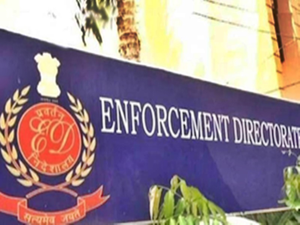Raipur | 18 July 2025 | Economy India Bureau
In a significant development with political and legal implications, the Enforcement Directorate (ED) on Friday carried out fresh searches at the Bhilai residence of former Chhattisgarh Chief Minister Bhupesh Baghel. The operation is linked to a money laundering investigation in connection with a massive Rs 2,100 crore liquor scam, in which Baghel’s son, Chaitanya Baghel, is allegedly involved
1️⃣ ED conducts fresh raids under PMLA
The ED conducted raids under the Prevention of Money Laundering Act (PMLA) after receiving fresh evidence against Chaitanya Baghel. The searches were held at a shared residence in Bhilai (Durg district) where both father and son live.
2️⃣ Liquor scam estimated to be worth over Rs 2,100 crore
The alleged liquor scam reportedly ran between 2019 and 2022, during Bhupesh Baghel’s tenure as Chief Minister. According to ED, a well-established liquor syndicate misappropriated funds, causing major revenue losses to the state treasury. Chaitanya is suspected of benefiting from these illegal gains.

3️⃣ Multiple high-profile arrests already made
The ED has previously arrested several senior figures in this case including:
- Kawasi Lakhma, former Excise Minister
- Anwar Dhebar, brother of Raipur Mayor
- Anil Tuteja, ex-IAS officer
- Arunpati Tripathi, Indian Telecom Services (ITS) officer
Properties worth over Rs 205 crore have already been attached in the case.
4️⃣ Bhupesh Baghel links raid to Adani coal project protest
In a sharp reaction, Bhupesh Baghel alleged that the raid was politically motivated and intended to silence his opposition to the Adani Group’s coal mining project in Tamnar, Raigarh district. The raid coincided with the last day of the state assembly’s Monsoon Session, when the issue of tree cutting for the Adani-linked project was scheduled for debate.
“Today is the last day of the Assembly session. I was set to raise the issue of forest destruction in Tamnar. ‘Saheb’ has sent ED to my house,” Baghel posted on social media platform X.
5️⃣ New FIR filed after Supreme Court quashed earlier ED case
Earlier in 2024, the Supreme Court had quashed the ED’s original FIR, which was based on an Income Tax Department complaint. Following this setback, the agency urged the state’s Economic Offences Wing (EOW) and Anti-Corruption Bureau (ACB) to file a fresh FIR using newly discovered evidence. On 17 January 2025, a new FIR was registered, naming over 70 individuals and firms, including former top bureaucrats and ministers.
📌 Background of the Liquor Scam
The ED alleges that a corrupt liquor cartel operated systematically with the support of certain politicians, government officials, and private contractors between 2019 and 2022. The scam involved:
- Bribery and illegal commissions from liquor contractors
- Forged records of liquor supply and excise collections
- Diversion of funds meant for the state treasury
- Money laundering through shell companies and political conduits
ED sources claim that proceeds of crime were funneled through a complex web of businesses, some of which were linked to individuals close to the political leadership.
🚨 Current Situation at Bhilai Residence
Following the raid, heavy police deployment was observed outside the Bhilai residence. Several Congress supporters gathered, raising slogans and accusing the central government of misusing federal agencies for political targeting.
🗨️ Congress’s Reaction
The Indian National Congress has strongly condemned the raid. Party leaders described the move as part of a “pattern of intimidation” against opposition figures who question central policies and large corporate interests like Adani Group.
As the liquor scam case evolves, the stakes continue to rise — not just legally for Chaitanya Baghel and others accused, but politically for the Congress party in Chhattisgarh. The intersection of alleged financial crime, corporate mining interests, and electoral strategy is now in sharp focus.
With the 2025 local elections nearing and public attention on forest land rights and corruption, this development could have lasting ramifications on both the state’s political dynamics and its legal environment.
(Economy India)














